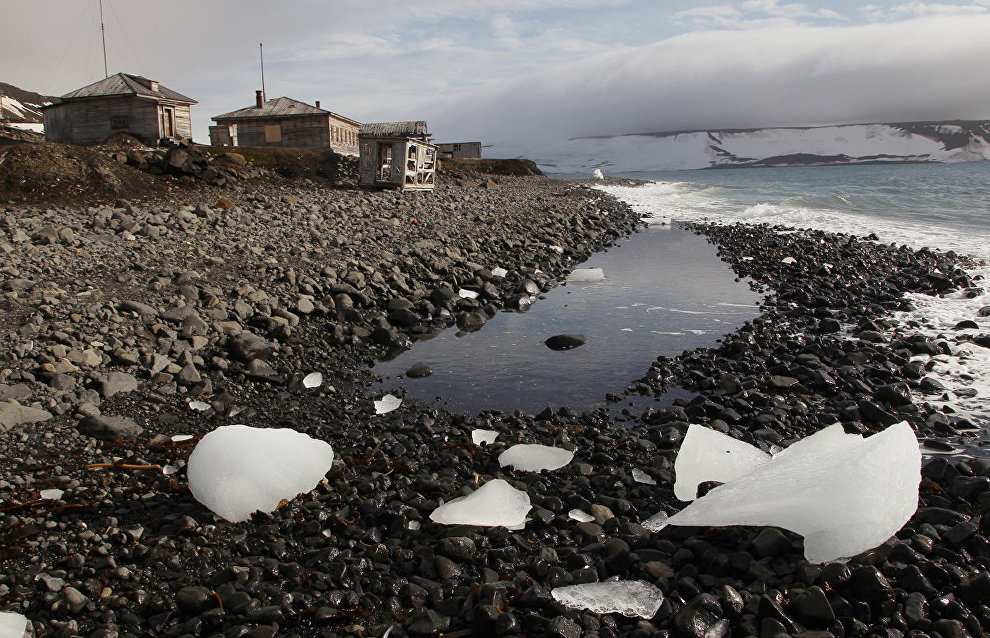The Russian Arctic: fall in love and come back
Part of our ongoing series about the people who work on Hooker Island’s Tikhaya Bay in Franz Josef Land. To start at the beginning, see “The Russian Arctic: The bears haven’t eaten me yet.”
The Boss of Tikhaya Bay
When we were leaving Tikhaya Bay, nobody was thinking about conservation. We simply shut the doors and left. Over time, windows were broken by bears, and buildings were filled with snow that eventually turned into ice. By 2012, we had managed to clear just two buildings of snow and ice.
"Our team of five was headed by Yury Karyakin. The entire station was divided into sections based on the potential to create environmental hazards, and a cleaning strategy was chosen for each. Everything looked terrible: buildings without windows or doors and lots of rusting fuel barrels. When we started the cleanup we counted about 300 of them," Andrei said. Since 2013 he has headed his own team of inspectors.
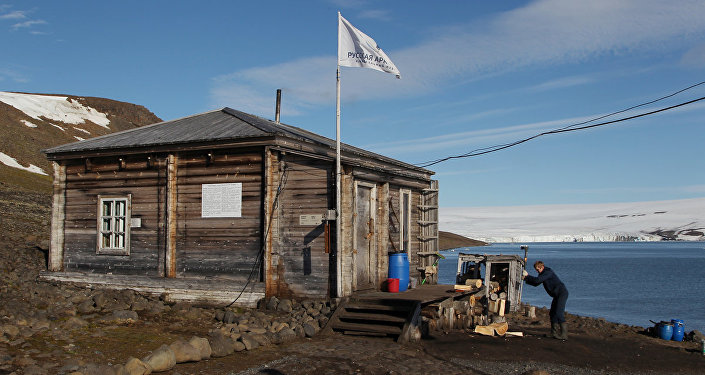
RIA Novosti. Vera Kostamo. Andrei Kunnikov
"I was 25 and I had to plan the expedition myself, from buying food, materials and instruments to selecting team members. At that time we worked with the Gandvik student construction team," Andrei recalls.
The most difficult work — the cleanup of the station — is over. We collected about a hundred tons of garbage in Tikhaya Bay. This is not much compared to other islands.
There are plans to build an open-air museum in Tikhaya Bay. This year a souvenir shop was opened. The station has a Russian Post office and completed ecological paths.
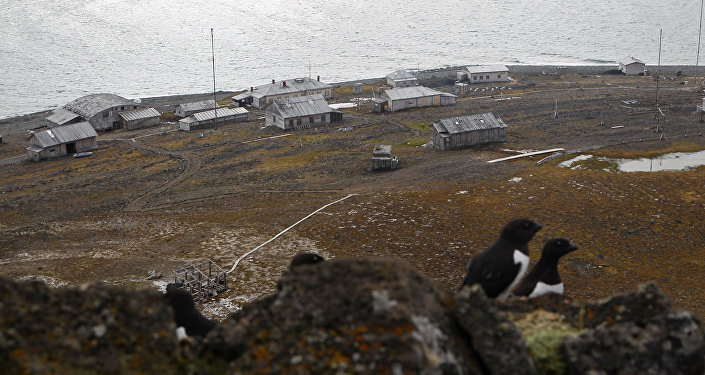
RIA Novosti. Vera Kostamo. In Tikhaya Harbor
"Regrettably, we lost the interiors of buildings, lab equipment and instruments. The sixty years that passed since the station was shut took a toll. Ships came to the bay and each visitor wanted to take a ‘souvenir,'" said Yevgeny Yermolov, senior research fellow at Russian Arctic National Park. "There are quite a few tourists that are interested in history but usually they only know foreign names: Nansen, Jackson and Amundsen. Nobody knows a thing about the Soviet period. We want the names of Sedov, Schmidt and Papanin to be heard again in the Arctic."
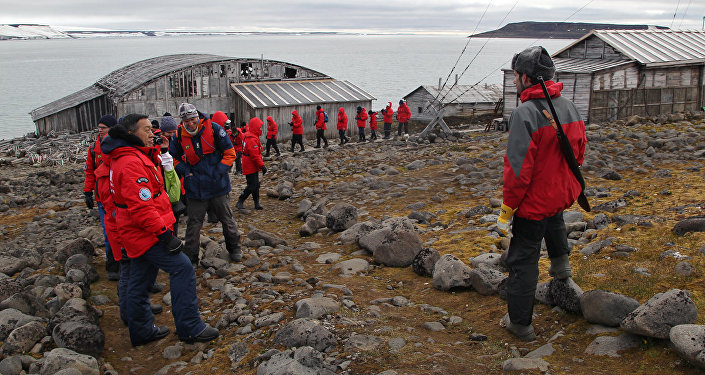
RIA Novosti. Vera Kostamo. Tourists on a tour in Tikhaya Harbor
Previously tour operators tried to avoid Tikhaya Bay in their routes but now they always bring guests here.
Arctic home
"Hey, boys, is everyone home?"
"Yes."
"We have some guests."
They rush to the window and see a bear playing with something outside a nearby building. Curiosity is one of the animal's qualities that help it survive.
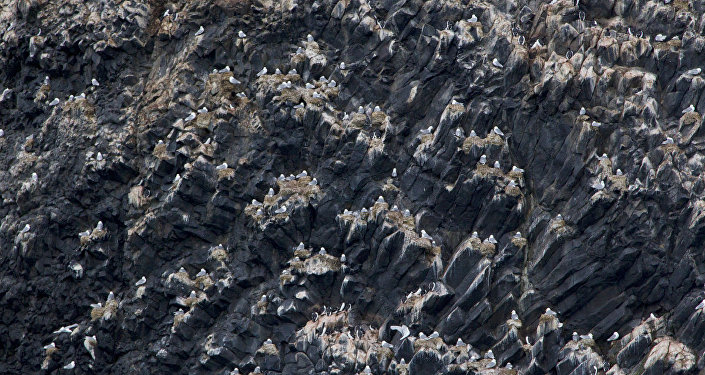
RIA Novosti. Vera Kostamo. Bird colony on Rubini Rock, Franz Josef Land, Russian Arctic National Park
If you go out without a rifle, you are done for. One mistake is all it takes — the Arctic doesn't give second chances.
You have to be careful on the water as well. There have been cases of walruses attacking boats to defend their territory. Now walruses — mothers with cubs or whole groups — swim into the bay every day. They make loud noises and let us look at them.
"We are proud of what we're doing here," Andrei says. He prepares a steam bath for his guys and our team of research fellows. "Tikhaya Bay is our home and we are trying to keep it in good shape," he says.
Fresh water that we are used to on the mainland is not available here. We have to use the meltwater running from the plateau. Vitamins are a must. There is no electricity here. Two generators work in turns. Usually we switch them on for a couple of hours to bake bread. For heating we used stoves, feeding them with wood that is unfit for restoring buildings.
Contact with the outside world is limited to emergency messages and rare calls to relatives. Work lasts from early morning till late at night.
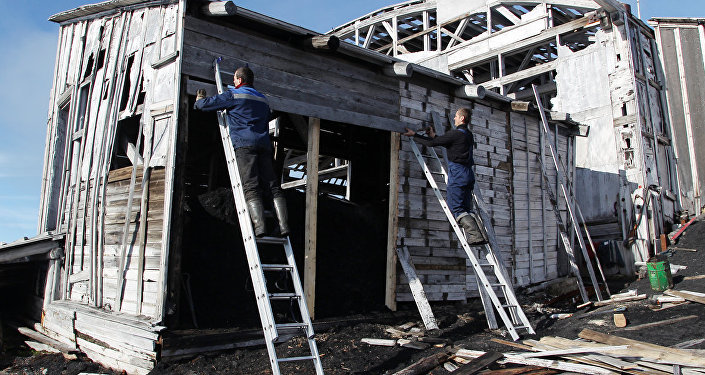
RIA Novosti. Vera Kostamo. Dmitry Pyzhik and Maxim Iyudin
Despite these conditions, people who visited Tikhaya Bay once always want to come back. This year only Andrei is a newcomer, others have already been here two or three times.
"I'm trying to keep life varied for the guys so that their time here does not turn into monotonous routine. They are learning how to run a boat, swim in diving suits, work a generator and clean rifles. This gives them life experience. Sometimes I can see on their faces that they are proud of themselves. That's what happens when a man is where he belongs."
Dima Pyzhik, third season in Arctic
I fell in love with the Arctic. It is a unique place. Literally a century ago people sacrificed their lives here to help their country. History has strong roots here.
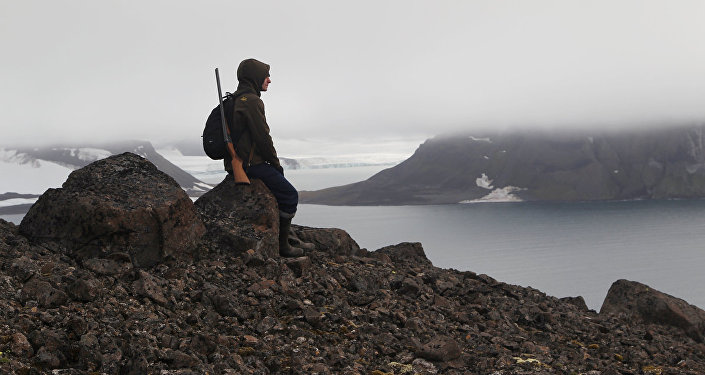
RIA Novosti. Vera Kostamo. Dmitry Pyzhik
Tikhaya Bay has changed beyond recognition in the past three years. It was a dump site after the Soviet era. Tourists and other visitors who saw it five or six years ago can feel the difference. I'm glad there are people who take care of the bay. It would be awful to see it abandoned again.
Your time here, away from human contact, forces you to rethink a lot of things. This is what I did while staying here for three years. I changed and feel closer to nature.
Residents of large cities find it hard to understand the effort it takes to reduce to a minimum or eliminate the damage that had already been done.
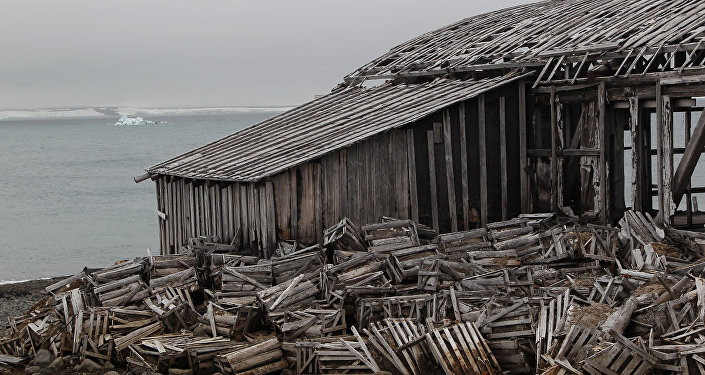
RIA Novosti. Vera Kostamo. Franz Josef Land, Russian Arctic National Park"
People in the Arctic trust each other more than on the mainland. In these three years here I made more friends than during my entire life.
There is a lot of joy and laughter in Tikhaya Bay. I often think about the Arctic foxes Seryoga and Yura. Last season these amusing creatures would come to us every day but we don't see them now.
The work is getting more interesting with every year. We are opening new buildings. If I did something useful here, that's good enough and will be a source of joy for me for the rest of my life.
Yulya Belyakova, second season in the Arctic
I've already been in the Arctic — on Alexandra Land. When I left it I knew for certain that I'd be back. So when they called me and offered a job here, I agreed immediately, without even hearing the terms of the contract. In the first days I was overwhelmed by emotions. I couldn't even tell whether they were positive or negative. It is hard to fathom where you are, not to mention express it. Looking at the map you realize that you are here — at the very top of the world. I think when I come home I'll talk endlessly about the Arctic to everyone.
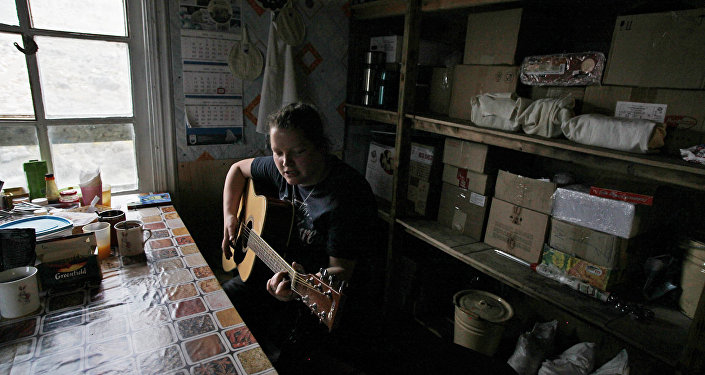
RIA Novosti. Vera Kostamo. Yulya Belyakova
It would be wrong to say that the Arctic is all about ice. This is untrue. Saying that it is all about icebergs won't tell you much, either. The Arctic is something extremely majestic, global, a separate world with its own laws and unique nature. It is difficult to express in words. It is not as aggressive and forbidding as they say. It is tranquil.
Everything here is in the right place, every stone. Every bird knows where its home is. For me this trip gives me fresh inspiration. I think when I return I'll have a different life and even a different way of thinking.
Everyone who has worked in Tikhaya Bay tries to return home — to the Arctic.
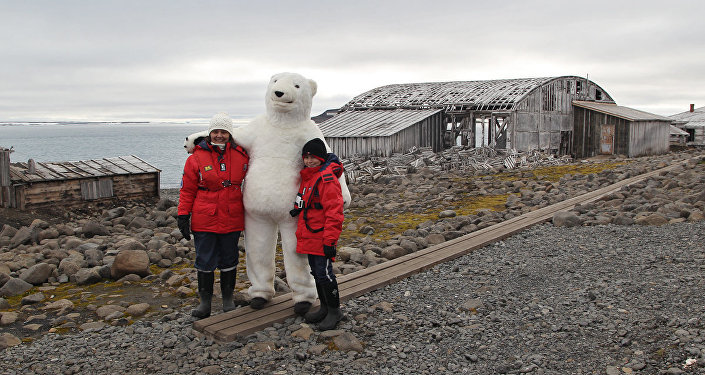
RIA Novosti. Vera Kostamo. Tourists in Tikhaya Harbor
Arctic.ru will continue publishing Vera Kostamo's stories.
